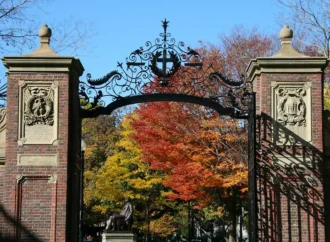It was 1803, and America was just coming into its own. But Princeton professor Samuel Miller (1769-1850) saw trouble on the horizon in an increasingly utopian attitude toward education.
In A Brief Retrospect of the Eighteenth Century he wrote:
“On the subject of Education, the century under review has given birth to a doctrine, which, though noticed in a former chapter, is yet too remarkable and too pregnant with mischief to be suffered to pass without more particular consideration in the present. It is, that Education has a kind of intellectual and moral omnipotence; that to its different forms are to be ascribed the chief, if not all the differences observable in the genius, talents, and dispositions of men; and that by improving its principles and plan, human nature may, and finally will, reach a state of absolute perfection in this world, or at least go on to a state of unlimited improvement. In short, in the estimation of those who adopt this doctrine, man is the child of circumstances; and by meliorating these, without the aid of religion, his true and highest elevation is to be obtained; and they even go so far as to believe that, by means of the advancement of light and knowledge, all vice, misery and death may finally be banished from the earth.”
As you can see, Miller was particularly troubled by the growing belief that education was the solution to all human woes, and that extending equal educational opportunities to all would result in a continually more perfect society.
Fast forward to today, and what do we have in America?
- Frequent invocation of the idea that education is primary means to end poverty and inequality.
- Recurring rhetoric that pins America’s future on more “investments” in education.
- An obsession with leveling academic performance between students of different racial and economic backgrounds.
- A widely-held assumption that tinkering with the structure of the education system (through new policies and legislation) will progressively produce children who are better educated.
Throughout history, what all utopian visions ultimately lack is an emphasis on human freedom. The architects of attempted utopias focus their efforts on constructing ideal structures into which they can simply plug people, or, as T.S. Eliot wrote, on “dreaming of systems so perfect that no one will need to be good.”
But, as any teacher quickly discovers, you can lead students to the waters of knowledge, but you can’t force them to drink. You can stick a child in school, but you can’t make him or her become educated. You can create an education system, but you can’t wholly manufacture an educated and moral populace through it.
Education is important. Education is very important. But it’s not a panacea, and it can’t work miracles apart from its human actors. A belief to the contrary is unfair to every school and school system.
















3 Comments
Scott Kelly
July 21, 2022, 1:46 pmSamuel Miller was OBVIOUSLY objecting to education NOT based on religion.
"In short, in the estimation of those who adopt this doctrine, man is the child of circumstances; and by meliorating these, without the aid of religion, his true and highest elevation is to be obtained;".
He further claims that those espousing such values believe that they will result with even DEATH being conquered
"by means of the advancement of light and knowledge, all vice, misery and death may finally be banished from the earth.”
What a TOTAL pile of crap
REPLYRick Gordon
July 22, 2022, 7:38 pmI believe that a good education for every American is the only hope to improvements in equality. Today’s economy demands people who can think, analyze, and solve problems (at all levels, most are simple for any individual).
REPLYThe biggest hurt we can do to any child is to prevent access to a good education. Clearly that should include STEM, history, civics, and language.
Education is as lifelong activity. It does not stop at 18 or 22 or ever.
Michael O'Connor
July 22, 2022, 9:36 pmBy 1803 the Age of Enlightenment (Age of Reason) was in full swing…His comments show opposition to the tenets of this movement… Science (scientism, idolatrising science to the extreme… without God), secular education, materialism, rationalism , constitutionalism, democracy, individualism, etc. were some of those tenets. It was a movement against the tyranny of the then monarchies and state churches of Europe. This movement heralded the beginnings of modernity. We still live under its tenets even in spite of post-modernity which is a reaction against some of those tenets.
REPLY